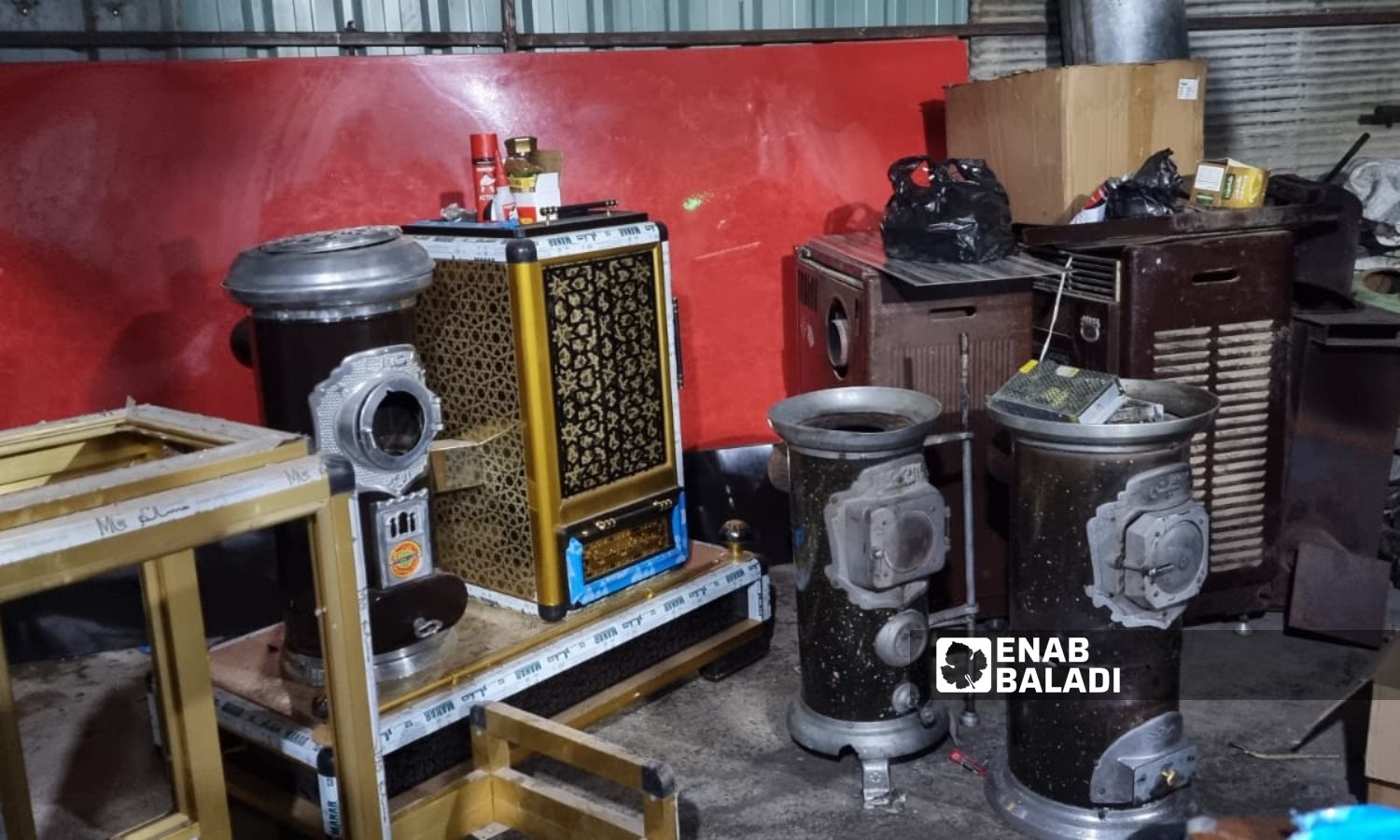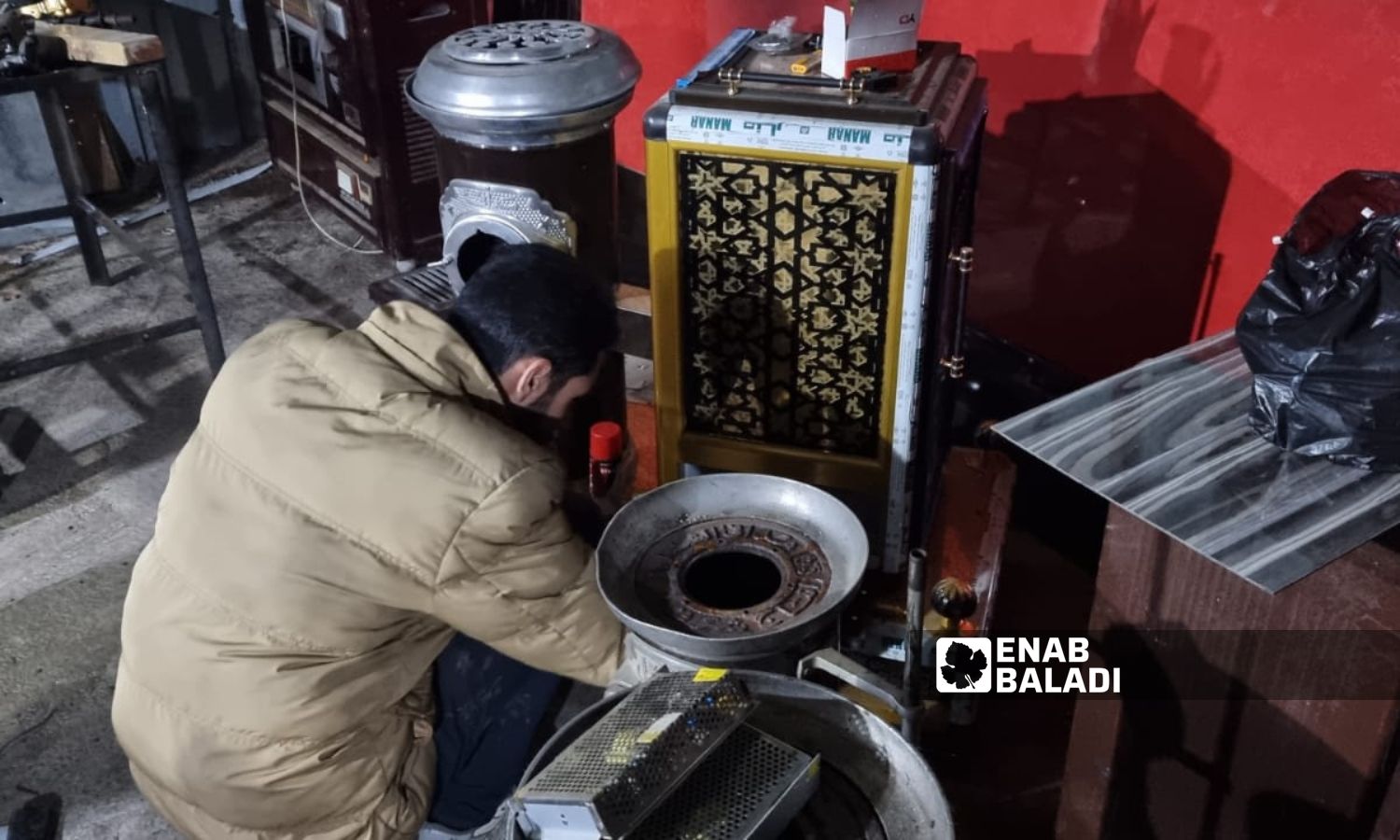



Faced with the cold of winter and the difficulty of accessing heating resources, residents of northern Syria are looking for alternatives to traditional heating methods to get through the season that passes harshly and slowly over the people amid an economic and living situation that does not allow the luxury of searching for alternatives.
Displaced from rural Aleppo, Shaher Razouk works on developing heaters based on scientific principles he learned at university and applying some of what he learned in the faculty of engineering. In addition to his experience in making fireplaces, he creates versatile units that help solve more than one problem at a time, in addition to heating.
Residents of Idlib, northwest Syria, resort to unconventional heating methods to cope with the burdens of winter and the severe cold due to the high prices of heating materials on the one hand and the living reality that makes it difficult to provide for daily life necessities.
Razouk, who is a civil engineer and owner of a fireplace manufacturing company, explained to Enab Baladi that the high prices of imported heaters from neighboring countries and the cost of heating materials are factors that pushed him to establish a company for manufacturing and developing fireplaces, according to available resources.
Initially, Razouk started producing pistachio shell fireplaces, which had become popular in Idlib over the past years. However, the rising prices of pistachio shells used as a heating fuel alternative, and people’s continuous search for fireplaces that can perform other tasks such as cooking and heating water, encouraged him to invent non-traditional fireplaces that work with several types of fuel and achieve multiple purposes or tasks for the user.
The company owner pointed out that studying engineering helped him tackle technical issues he applied to fireplaces, such as complete combustion, air intake and exhaust during combustion, and the amount of air necessary to complete the combustion process effectively.

A man conducts maintenance on a heating appliance in northwest Syria – January 18, 2024 (Enab Baladi/Anas al-Khouli)
During the winter, Syria Civil Defence teams constantly document varying degrees of severity in fires caused by heaters. On January 23, an elderly man in the al-Ard al-Tayiba camp in the town of Salwa, north of Idlib, suffered second-degree burns due to a fire caused by a fireplace.
According to Razouk, his company developed about a year ago a heater that works with fuel, wood, and pistachio shells, in addition to side functions such as heating water and cooking, as it contains an internal oven.
This came after developing various types of heaters and introducing new models that overcame some aspects that formed a major concern for users. This was done by reducing the exterior shape and designing a concealed fuel compartment to improve the appearance of the stove, which weighs 80 kilograms and is priced at $275, a price comparable to imported heaters. The fireplace also has an estimated lifespan of ten years.
Najm al-Din Najm (30 years old), who works in developing heaters, said to Enab Baladi, “We used to design fireplaces that work with pistachio shells in the area of Khan Sheikhoun due to the abundance of these materials in those areas. After the displacement and the rise in prices of pistachio shells due to the decline in local production, we worked on developing heaters that work with several types of heating fuel.”
The prices of heating materials vary from one year to another, forcing families to switch between these materials. In 2024, the price of one ton of pistachio shells reached $175, which is $50 less than the previous year, while the price of wood and pomace increased by $50-$75 compared to last winter, bringing the ton price to about $240.
According to Najm, these heaters are in demand for reasons related to the quality of metal used in manufacturing, which provides savings on heating materials due to heat storage and distribution. Also, the level of safety in modern heaters is higher compared to pistachio shell heaters, which require constant monitoring to prevent the fire from reaching the channel passing the heating materials towards the combustion site—a matter that causes house fires.
Those working in fireplace manufacturing face difficulty importing raw materials, preventing the factory from covering the demand. Moreover, more than half of the stock in the warehouses needs assembly due to a lack of raw materials, such as thermal glass and “thermal Tefal” spray used for painting the heaters.
Importing these materials takes about two and a half months, which hinders the production process, along with the rise in prices of these materials, which reflects on the cost of the fireplaces produced by Najm, ranging between 100 and 300 US dollars.
The Syria Civil Defence documented 621 fires in 188 cities, towns, and villages in northwest Syria during the last three months of 2023, resulting in the death of a woman and a child and the injury of 31 civilians, including seven children and three women, according to statistics obtained by Enab Baladi from the organization.
During the first three weeks of January, the Civil Defence teams extinguished 105 fires, including 41 in civilians’ homes and 17 in camps, resulting in 17 civilians suffering from burns and suffocation.
if you think the article contain wrong information or you have additional details Send Correction